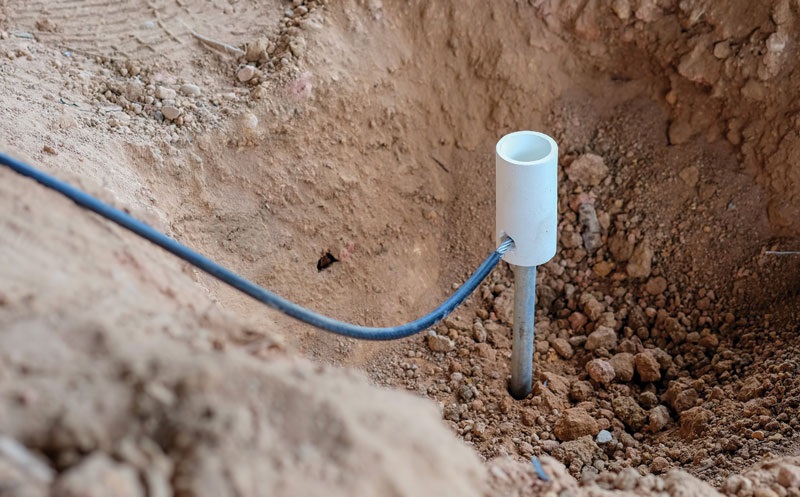Electrical grounding, also known as electrical earthing, provides a way for electric appliances to discharge excessive electricity. Properly grounding your electronic equipment keeps it protected and reduces the risk of electric shock. To be grounded, equipment needs to be connected to a ground wire that leads to a copper rod that's buried underground in the soil. Electrical cables that are grounded have three prongs, and the prong on the bottom of the plug is the one that connects to the ground wire in the power outlet. Because of its ability to protect sensitive electronics and reduce electric shock hazards, modern electrical systems are designed with grounding in mind.
When too much electricity flows through the live wire into the equipment, the excess electricity will be rerouted through the ground wire towards the buried copper rod. The ground wire and the copper rod are both highly conductive, so excess electricity within the appliance will naturally flow into it. Since the copper rod is buried underground, it's a safe place to discharge high amounts of electricity. Rerouting excess electricity protects equipment from dangerously high voltages that can damage the equipment or shock people who touch it. To learn why it's important to make sure all of your electronic equipment is grounded, read on.
Protects Equipment From Static Electricity
Static electricity can build up on the surface of equipment. If it discharges, it can cause serious damage. While the total amount of electricity in a static discharge is low, it's discharged very quickly. The high voltage involved in a discharge of static electricity can ruin sensitive electronics. Connecting equipment to a ground wire provides a safe pathway to discharge the static electricity, preventing equipment from being damaged by a discharge of static electricity.
Stops Lightning Strikes Near Power Lines From Destroying Equipment
When lightning strikes near power lines during a storm, it can travel into the power lines and cause an extreme voltage spike to anything that's connected to them. The voltage can destroy any electronic equipment that's affected by the lightning strike. Lightning that strikes a building directly can also cause a voltage spike to travel through the electrical wiring inside. Properly grounding your electronic equipment provides an alternate pathway for the sudden surge in electricity caused by a lightning strike. The excess electricity from the lightning will travel through the ground wire to the buried copper rod in the ground. Once it reaches the soil, the power surge will discharge itself harmlessly underground instead of causing damage to the equipment.
Eliminates Electromagnetic Interference
Electromagnetic interference can occur when any metal object is connected to a circuit that's carrying a live current. Electromagnetic waves will radiate from the metal, and the waves can interfere with nearby electronic devices. Sensitive electronics like circuit boards are particularly susceptible to electromagnetic interference, so computers and phones in an area with strong electromagnetic radiation may not work correctly. When electronic equipment is grounded correctly, it won't cause any electromagnetic interference. Any excess current running through the device will return to the ground instead of electrifying the metal and causing it to radiate electromagnetic waves.
Reduces the Risk of Electric Shock
When equipment isn't properly grounded, it can become a shock hazard to people nearby. If the neutral wire leading to the equipment is broken or if the equipment experiences a power surge, metal components inside the equipment can become electrified. Anyone who touches the electrified metal will be shocked, which can result in severe injury. By connecting equipment to a ground wire, electricity won't be able to build up inside the equipment. Excess electricity will flow through the ground wire and be safely discharged into the ground, keeping the equipment safe to touch.
Prevents Damaging Voltage Surges
The electricity running through power lines may periodically undergo small spikes in voltage. These voltage surges can damage sensitive electronic equipment. Electronic equipment is designed to run on a power source that supplies a constant, stable voltage. Even small spikes in the voltage can cause damage to sensitive electronics like circuit boards. When you connect electronic equipment to a ground wire, it won't be affected by these small voltage spikes. The excess voltage will travel through the ground wire and harmlessly dissipate into the ground.
Overall, grounding electronic equipment helps protect it from static electricity, lightning strikes and voltage surges traveling through the power lines. It also prevents equipment from interfering with nearby electronics by eliminating electromagnetic radiation. Keeping equipment grounded also makes homes and businesses safer by reducing the risk of electric shock.
While ground wires are common in modern electrical systems, the wiring in older buildings may not have ground wires. If your home or business has old electric wiring and your equipment isn't grounded, you should strongly consider contacting an electrician and having your wiring upgraded. Adding ground wires to your electrical wiring is inexpensive and will help keep you and your electronics safe.

